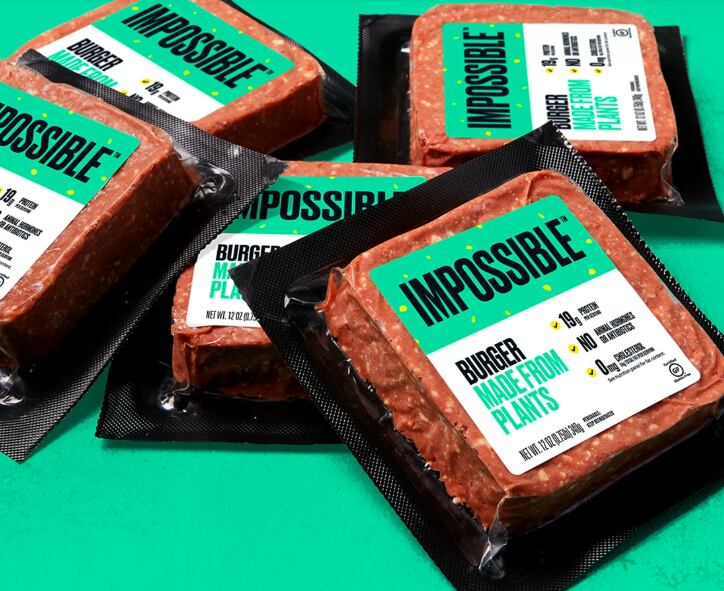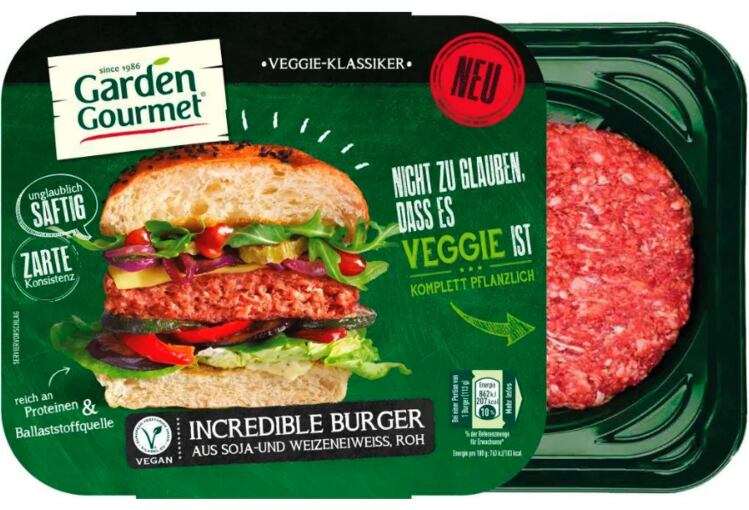A Dutch court has ruled against Nestlé following a legal dispute between the Swiss food giant and US-based Impossible Foods.
Nestlé will now be forced to rebrand its plant-based Garden Gourmet Incredible Burger – which the court judged could confuse consumers due to visual similarities between ‘incredible’ and ‘impossible’ – for the EU market.
“We are disappointed by this provisional ruling as it is our belief that anyone should be able to use descriptive terms such as ‘incredible’ that explain the qualities of a product,” a Nestlé spokesperson told FoodNavigator.
“We will of course abide by this decision, but in parallel, we will file an appeal.”
A transatlantic food fight
The judgement was handed down by District Court of the Hague in the Netherlands on 27 May 2020, following an infringement claim under Article 9(2)(b) of the EU Trade Mark Regulation.
The claim was made by Silicon Valley-backed Impossible Foods, a start-up best known for its Impossible Burger. The infamous plant-based burger, formulated to mimic the taste and texture of meat (the Impossible Burger ‘bleeds’ thanks to its star ingredient, heme), first launched in the US in 2016.
Impossible Foods registered IMPOSSIBLE BURGER as an EU trade mark in February 2019 for, amongst other goods, plant-based meat substitutes and plant-based burger patties.
Nestlé vs Impossible Foods invalidation proceedings
In March 2019, Nestlé applied to the EU Intellectual Property Office to declare Impossible Food’s IMPOSSIBLE BURGER EU trade mark registration invalid.
According to Nestlé, the mark ‘IMPOSSIBLE BURGER’ is descriptive, and readily understood by consumers to mean a burger that is difficult to make. Also, the mark is devoid of distinctive character, as the term ‘Impossible Burger’ is a mere promotional message, the Swiss food giant claimed.
The invalidation proceedings are still ongoing, with Impossible Foods filing its observations in reply in May 2020.
When Nestlé launched its own vegetarian burger under the name ‘Incredible Burger’ – as part of its Garden Gourmet range – Impossible Foods sued Nestlé for infringement of its EU trade mark in the District Court of The Hague.
According to Impossible Foods, the use of the name ‘Incredible Burger’ infringed its EU trade mark. The company applied for a provisional injunction to stop Nestlé from marketing its product under that name.
The Dutch court ruled in favour of Impossible Foods, granting a provisional pan-EU ban against Nestlé prohibiting use of “Incredible Burger” as a trade mark.
Specifically, the court found that ‘Incredible Burger’ is visually similar to ‘Impossible Burger’, due to both words consisting of the same number of letters, starting with the letter ‘I’, and the first word ending with ‘ible’. The two brands were deemed phonetically similar to some degree, with a small degree of conceptual similarity.
Further, the Nestlé product is a plant-based meat substitute– which is covered by the EU registration of ‘Impossible Burger’. The court judged, therefore, that there was a likelihood of confusion between the brands amongst consumers.
Dubious dealings?
The court also noted that Nestlé had previously approached Impossible Foods for a license relating to the use of ‘Impossible Burger’. During these license negotiations, Impossible Foods shared confidential and sensitive information with Nestlé. License negotiations have since broken down.
These dealings, followed by Nestlé’s launch of its ‘Incredible Burger’, raised a suspicion that Nestlé had consciously chosen a strategy to frustrate the successful launch by Impossible Foods of its ‘Impossible Burger’ product in the European market.
In the US, Nestlé was also forced to rebrand its vegetarian burger to ‘Awesome Burger’ following a trade mark infringement claim there.

It has been suggested that the May 27 ruling may not have had the same outcome had it taken place in England.
“Given the past approaches taken by English courts, an English court would have much been less likely to find infringement in this case,” Richard Plaistowe, Principal Associate for law firm Mills & Reeve, told FoodNavigator.
“In particular, I cannot see an English court being ready to find ‘Incredible Burger’ to be visually or phonetically similar to ‘Impossible Burger’. There is some conceptual similarity but not enough in my view for there to be a likelihood of confusion.”
For Plaistowe, who specialises in intellectual property law, the Dutch court was ‘clearly influenced’ by what it considered to be Nestlé’s ‘bad faith dealings’ with Impossible Foods.
“So, while the judgement may be seen to be morally fair, I believe that it is legally questionable,” he told this publication.
“As this is a provisional ruling only, this may be overturned in later proceedings (or on appeal). However, whether Nestlé, having been forced to rebrand, if it ultimately wins will relaunch its ‘Incredible Burger’ brand, is another question.”
So if not ‘Incredible’, then what?
Nestlé is indeed planning to appeal the decision. But in the meantime, will rebrand its ‘Incredible Burger’ the ‘Sensational Burger’.
“The name evokes the ‘senses’ that are stimulated by our burger: the visible transformation and aroma when cooking, the sound of it sizzling in the pan or on the grill, the taste and texture,” explained the company spokesperson.
The new Garden Gourmet Sensational name will be applied to Nestlé products that previously used the ‘incredible’ descriptor in Europe, the spokesperson clarified. “With this evolution we continue to focus our energies on what really matters to consumers – delivering truly outstanding plant-based products that are good for you and good for the planet.”


